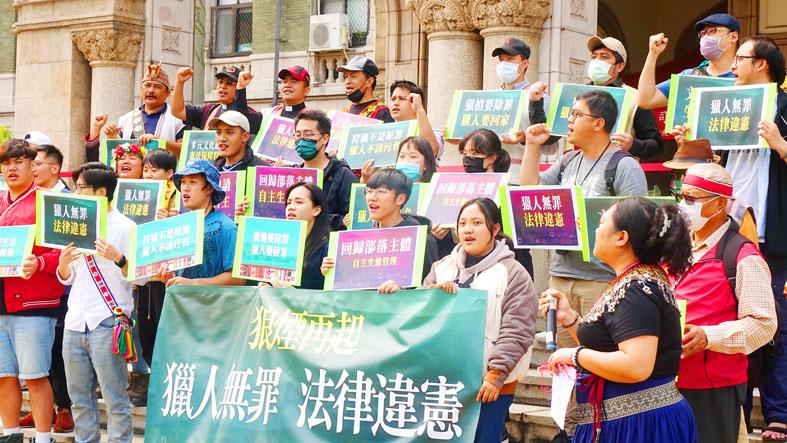Oral arguments began on Tuesday in a case that is to determine whether laws restricting hunting and firearms infringe on the constitutional rights of Aborigines.
The case stems from the August 2013 arrest of Bunun hunter Tama Talum, also known as Wang Guang-lu (王光祿), after he was found in possession of two dead protected animals and a shotgun.
The man from Taitung County’s Haiduan Township (海端) said during a trial that he hunted the animals for his ailing 94-year-old mother.

Photo: Wang Yi-sung, Taipei Times
Talum was sentenced to three years and six months in prison for contravening the Wildlife Conservation Act (野生動物保育法) and the Controlling Guns, Ammunition and Knives Act (槍砲彈藥刀械管制條例).
In Talum’s appeal to the Supreme Court in 2017, the judges decided to suspend the trial until the Council of Grand Justices issues an interpretation on whether the laws breach the constitutional rights of Aborigines.
Talum was joined in the petition by Pan Chih-chiang (潘志強), a Puyuma who was sentenced on similar charges, and the Taoyuan District Court.
The justices are to hear arguments from the petitioners, the Ministry of the Interior, the National Police Agency, the Council of Agriculture, experts on Aboriginal issues, conservationists and others, before issuing an interpretation within one month.
In a statement issued by the Legal Aid Foundation, which is helping with their defense, Talum and Pan said that hunting is an “important and immutable part of village life.”
“Hunting is not a profession; it is a skill that must be learned by protectors in traditional fields, a way of life passed down to the present, a necessary medium connecting members of a tribe with their ancestors,” Pan said. “And it is an important symbol for Aborigines.”
Under current laws, Aborigines are only allowed to use homemade firearms, which opponents say are unsafe and inhumane, as it is difficult to accurately target animals to ensure instant death.
At the hearing, Ministry of the Interior representative Kung Wen-hsiang (宮文祥) said that homemade firearms are sufficient to protect the hunting rights of Aborigines.
Homemade shotguns must be front-loading and therefore less efficient to better protect the rights of others, Kung said.
However, National Police Agency senior specialist Feng Chiang-sheng (馮強生) said that homemade firearms pose a risk of backfiring, so the law was amended last year, and various agencies are working on how to provide safe gun components to Aborigines.
Talum and Pan are also challenging the clarity of the Wildlife Conservation Act, as it only stipulates penalties for hunting “general wild animals” without permission, but does not address protected species.
Forestry Bureau Director-General Lin Hwa-ching (林華慶) said in court that there were omissions, which the bureau is working on rectifying.
First, it plans to amend Article 20-1 to allow Aborigines to hunt for “personal use,” in addition to “traditional cultural and ritual” purposes, Lin said.
He said Aborigines should not face criminal charges, even if they kill a protected species without permission, adding that Article 50-1 would be amended to reflect this.
However, he emphasized that the law would not protect commercial hunting.
The draft amendment was sent to the Executive Yuan for review in January last year and, if approved, would be forwarded to the Legislative Yuan, Lin added.
Attorney Hsu Cheng-tzu (許正次), representative for the petitioners’ legal team, said that if the ruling falls in their favor, it would hopefully show lawmakers their obligation to create a friendly environment for Aboriginal hunters.

Taiwan is to commence mass production of the Tien Kung (天弓, “Sky Bow”) III, IV and V missiles by the second quarter of this year if the legislature approves the government’s NT$1.25 trillion (US$39.78 billion) special defense budget, an official said yesterday. Commenting on condition of anonymity, a defense official with knowledge of the matter said that the advanced systems are expected to provide crucial capabilities against ballistic and cruise missiles for the proposed “T-Dome,” an advanced, multi-layered air defense network. The Tien Kung III is an air defense missile with a maximum interception altitude of 35km. The Tien Kung IV and V

The disruption of 941 flights in and out of Taiwan due to China’s large-scale military exercises was no accident, but rather the result of a “quasi-blockade” used to simulate creating the air and sea routes needed for an amphibious landing, a military expert said. The disruptions occurred on Tuesday and lasted about 10 hours as China conducted live-fire drills in the Taiwan Strait. The Civil Aviation Administration (CAA) said the exercises affected 857 international flights and 84 domestic flights, affecting more than 100,000 travelers. Su Tzu-yun (蘇紫雲), a research fellow at the government-sponsored Institute for National Defense and Security Research, said the air

Taiwan lacks effective and cost-efficient armaments to intercept rockets, making the planned “T-Dome” interception system necessary, two experts said on Tuesday. The concerns were raised after China’s military fired two waves of rockets during live-fire drills around Taiwan on Tuesday, part of two-day exercises code-named “Justice Mission 2025.” The first wave involved 17 rockets launched at 9am from Pingtan in China’s Fujian Province, according to Lieutenant General Hsieh Jih-sheng (謝日升) of the Office of the Deputy Chief of the General Staff for Intelligence at the Ministry of National Defense. Those rockets landed 70 nautical miles (129.6km) northeast of Keelung without flying over Taiwan,

A strong continental cold air mass is to bring pollutants to Taiwan from tomorrow, the Ministry of Environment said today, as it issued an “orange” air quality alert for most of the country. All of Taiwan except for Hualien and Taitung counties is to be under an “orange” air quality alert tomorrow, indicating air quality that is unhealthy for sensitive groups. In China, areas from Shandong to Shanghai have been enveloped in haze since Saturday, the ministry said in a news release. Yesterday, hourly concentrations of PM2.5 in these areas ranged from 65 to 160 micrograms per cubic meter (mg/m³), and pollutants were